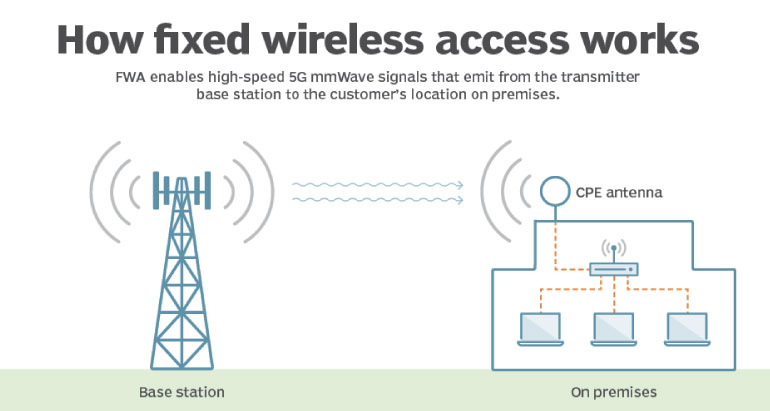Fixed wireless access provides broadband connectivity for subscribers at fixed locations. FWA use cases include locations with geographical constraints, temporary setups and more.
FWA features
FWA can provide several benefits, especially compared with other forms of wireless connectivity. Features of FWA include the following:
- Affordable rates.
- High speeds.
- IoT integration.
- Intercommunication.
- Network security.
Affordable rates
Copper-based networks typically incur high costs due to the material, installation, maintenance and repair. With FWA, on the other hand, users have to pay a one-time cost to install CPE or rent it for a minimal fee. Users typically spend less on FWA lifecycle costs.
High speeds
FWA provides high-strength signals for fast network connectivity similar to wired broadband infrastructure but at cheaper rates. Additionally, mmWave 5G FWA use cases offer cloud access, data storage and quick downloads.
IoT integration
FWA promotes rapid, cost-effective and secure IoT integration in remote enterprises compared with traditional network infrastructure. FWA enables faster IoT device communication, third-party integration, control, monitoring and real-time updates.
Intercommunication
FWA can benefit enterprises that use VoIP for internal communication and addressing customer inquiries. Some top features of FWA VoIP include low latency in voice packet transfer, improved audio and high-quality video conferencing.
Network security
Just like Wi-Fi enables users to set password protections, FWA also provides users with options to secure their networks. FWA use cases are in regulatory compliance to protect data and user privacy. FWA ensures secure data packet transfer, authentication, control, protection against attacks and network security.
FWA use cases
Ericsson's June 2023 "Mobility Report" predicted that the number of global active FWA connections will rise to 300 million by 2028, up from 100 million in 2022. An approximate 80% of connections will be 5G FWA. 5G FWA is slowly replacing 4G FWA because it offers higher bandwidth, lower latency and more reliability through narrow beam generation.
Reasons to use FWA instead of traditional wired networks include the limitations of wired network infrastructure, locations in remote areas or with difficult terrain, and an eager subscriber base.
Other FWA use cases include the following:
- Buildings located in remote areas.
- Businesses with temporary office setups.
- Locations situated in construction sites.
- Businesses located in canal cities.
Remote areas
A common use case of FWA is enterprises or residences in remote locations with a smaller population and lower teledensity. These locations are typically rural, suburban and disadvantaged areas. Geographical constraints deprive these locations of many modern necessities, like high-speed connectivity, healthcare access, business opportunities and more.
Mobile network operators (MNOs) typically find it difficult and impractical to roll out broadband in these areas. Even if it's possible to deploy wired broadband infrastructure, maintenance is tough and expensive. MNOs implement FWA to provide last-mile high-speed connectivity and enable enterprises to grow economically, while saving on the average cost of operations. Moreover, high-speed connectivity might enable small households to find remote work that enables their economic development.
Temporary setups
FWA is a suitable choice for enterprises that move their office locations frequently. When enterprises configure wired network infrastructure in temporary locations, it increases the operating cost of the business. With FWA, enterprises pay a one-time cost to purchase and install CPE on premises.
Enterprises that use FWA in temporary setups can access broadband connectivity at affordable rates. Enterprises can quickly implement FWA in their offices and unsubscribe when they move operations. Depending on the choice of operator, temporary offices can save expenses when it's time to migrate.
Moreover, locations with volatile weather conditions often lose network access due to malfunctioning or damaged wired infrastructure. FWA can integrate seamlessly within wired network infrastructure in remote enterprises and serve as an effective backup to maintain a constant network connection.
Construction sites
Construction sites typically have complex layouts and irregular placement of materials that don't support traditional wired network infrastructure. In addition, remote construction sites might not offer LTE connectivity and provide poor-quality communication.
Construction sites can use FWA as a temporary deployment option for months -- or even years -- to enable connectivity for effective communication, collaboration, project planning and management. Workers can access project information, like designs, layouts and plans, faster and more easily. Moreover, owners and stakeholders can gain insights and updates to monitor the ongoing work.
Canal cities
Cities built across water bodies can rely only a little on a wired network infrastructure. Internet access through Wi-Fi is the most suitable option for heavily populated canal cities, like Venice, Italy, and Suzhou, China. Users can access the internet even when commuting across the city in boats.
While cities in developed countries offer free Wi-Fi in many areas, certain businesses might need a more reliable option than Wi-Fi. FWA is gradually gaining momentum because of the benefits it offers. With FWA, enterprises in canal cities can access the network faster with more on-premises coverage than their city's Wi-Fi.
Several industries can benefit from FWA
FWA can benefit various industries, such as education, healthcare, e-commerce, logistics, manufacturing and more:
- Educational institutions. FWA in educational institutions can support e-learning and research and help maintain records like grades, attendance and schedules.
- Healthcare. FWA can support telemedicine apps that provide healthcare access, doctor consultations and diagnosis in underprivileged locations.
- Shopping centers. Shopping malls and restaurants can use FWA to provide on-site connectivity for customer engagement and faster payments.
- Manufacturing and logistics. FWA in supply chain operations, like manufacturing and logistics, can support inventory management, barcode scanning, fleet management, audits and more.

